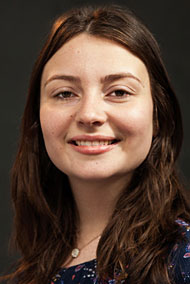For the second time in five years, Nina Wilson will polish her Russian language skills with an extended stay in Russia.

The Lawrence University sophomore will spend eight weeks (June 18-Aug. 19) in the city of Vladimir courtesy of a Critical Language Scholarship (CLS). Administered by the U. S. Department of State’s Bureau of Educational and Cultural Affairs, the CLS is a summer overseas language and cultural immersion program for American undergraduate and graduate students. Wilson is the fourth Lawrence student since 2010 to receive a CLS.
While in Vladimir, a city of nearly 350,000 people a little more 100 miles east of Moscow, Wilson will live with a host family and study at the KORA Russian Language Center.
A home-school graduate from Grayslake, Ill., Wilson got started on her Russian as a 12-year old. A Russian family friend who was teaching a class on Russian literature that Wilson was taking, asked if she wanted to learn the language.
“I was like, ‘okay,’” said Wilson, who is pursuing majors in government and Russian studies at Lawrence. “I’ve been studying it ever since.”
In 2012, Wilson participated in a high school version of the CLS program— the National Security Language Initiative for Youth — in the city of Nizhny Novgorod, previously known as Gorky, 150-miles east of Vladimir.
Even though she began her Lawrence career by taking third-year level Russian classes as a freshman, Wilson is looking forward to improving her reading and writing skills while in Vladimir as well as her language proficiency.
“Nina has been working hard towards her goal of becoming fluent in Russian. I have no doubt she will thrive in the intensive, immersive environment that the Critical Language Scholarship provides.”
— Victoria Kononova, assistant professor of Russian studies
“The area I am weakest in is speaking ability, so if I can have really solid conversations by the end of the program, I’ll be really happy,” said Wilson. “I’m just excited to see a new place, learn about history and culture there and visit more of Russia then when I was there in 2012.”
She is especially looking forward to enjoying the cuisine.
“I love Russian food,” she says enthusiastically. “My favorite dish is pelmeni which are these Russian dumplings. You can put chicken or potatoes or whatever in them and they’re really good.”
Victoria Kononova, assistant professor of Russian Studies, calls Wilson “an exemplary student: curious, dedicated, creative and always eager to try and learn something new.”
“Nina has been working hard towards her goal of becoming fluent in Russian” Kononova added. “I have no doubt she will thrive in the intensive, immersive environment that the Critical Language Scholarship provides.”
Despite the current rise in tensions between the United States and Russia, Wilson isn’t worried about any potential danger during her trip abroad.
“The main thing I’m concerned about is how to talk to people about politics and current events. I feel like there may be some potential disconnect if I am talking to my host family about the news since we come from very different perspectives. But I’ll also try to better understand where they might be coming from and have a healthy discourse.”
According to Kononova, Wilson’s interest in contemporary Russian politics makes it crucial she get first-hand experience with Russia and Russians.
“I hope that the CLS will help her get that kind of ‘inside knowledge’ and bring her closer to her ambitious academic and professional goals,” said Kononova.
The CLS was launched in 2006 to increase opportunities for American students to study critical-need languages overseas and expand the number of Americans studying and mastering critical-need languages, including Arabic, Chinese, Indonesian Japanese, Korean, Persian, Russian, Indic (Bangla/Bengali, Hindi, Punjabi and Urdu) and Turkic (Turkish and Azerbaijani).
About Lawrence University
Founded in 1847, Lawrence University uniquely integrates a college of liberal arts and sciences with a nationally recognized conservatory of music, both devoted exclusively to undergraduate education. It was selected for inclusion in the book “Colleges That Change Lives: 40 Schools That Will Change the Way You Think About College.” Engaged learning, the development of multiple interests and community outreach are central to the Lawrence experience. Lawrence draws its 1,500 students from nearly every state and more than 50 countries.